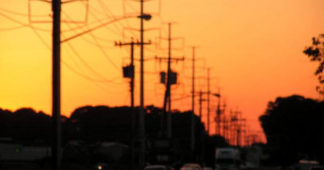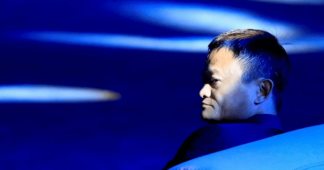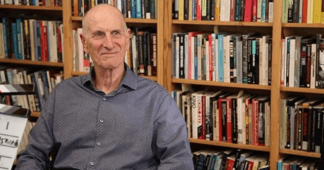Adam McKay’s new movie may be the first film in 57 years to equal the comedy and horror of Stanley Kubrick’s masterpiece.
By Jon Schwarz
If you’re wondering whether we’ll do anything about global warming before it destroys civilization, think about this ominous fact: It occupies barely any space in popular culture.
This contrasts with the gusher of movies and books in the 1960s, ’70s, and ’80s about nuclear war. Anyone old will remember “The Day After,” “War Games,” “The Planet of the Apes,” “99 Luftballons,” and many, many more in which nuclear terror was the central subject or background.
All of this helped generate a worldwide anti-nuclear movement, which in turn generated a larger audience for anti-nuclear culture, which in turn strengthened the movement — all in a virtuous circle. In other words, we avoided atomic Armageddon in part because we spent lots of time imagining it and so were motivated not to experience it in reality. But with global warming, there are few indications that we’re imagining it at all. We’re blithely stumbling forward in a fog, with little comprehension of the catastrophe we’re stumbling toward.
That’s why the new movie “Don’t Look Up” is extremely good news, unless you’re hoping that humanity will obliterate itself and be succeeded in 50 million years by superintelligent squirrels.
The fountainhead of nuclear war culture in the U.S. was Stanley Kubrick’s “Dr. Strangelove, or: How I Learned to Stop Worrying and Love the Bomb,” released in 1964. It pried open space into which countless other creators rushed. “Don’t Look Up” has the potential to do the same thing for global warming.
“Dr. Strangelove” is usually called a black comedy, but that doesn’t do it justice. Instead, you could say it’s a Vantablack comedy, the blackest comedy ever invented by the human mind. “Don’t Look Up” may be the first movie in 57 years to equal it, in both the darkness and the laughs.
“Don’t Look Up” was directed and written by Adam McKay and based on a story by himself and the journalist David Sirota. (I’ve been friendly with Sirota for a long time.) McKay established himself as one of the funniest filmmakers in America with work like “Old Glory Insurance” — persons denying the existence of robots may be robots themselves — “Anchorman,” “Talladega Nights: The Ballad of Ricky Bobby,” and “The Other Guys.” Then he swerved in 2015 to make “The Big Short,” about the implosion of the housing bubble, followed by “Vice,” about former Vice President Dick Cheney’s bland rise to brutal power.
With “Don’t Look Up,” McKay has taken all of his talents, and all of the power he’s accumulated, to pull together the world’s biggest movie stars to confront the most important subject in existence.
Taken literally, the movie is about a huge comet heading directly toward us. It’s the same size as the one that hit the Gulf of Mexico in the Cretaceous-Paleogene extinction event, which wiped out three-quarters of all species on the planet. Before that comet, dinosaurs ruled the earth, and our evolutionary ancestors were little vole-like creatures scurrying around trying not to get eaten. Since the comet, the tables have turned, and every year we eat 65 billion chickens, the dinosaurs’ persecuted remnants.
But as McKay has said, this is “the most thinly disguised metaphor in the history of metaphors.” It is in fact about our profound commitment to cooking ourselves to death. The movie begins with the sound of boiling water and features two appearances by polar bears.
Pretending it’s about a comet, however, makes it possible for “Don’t Look Up” to fit the format of a standard blockbuster that the median moviegoer will love. Instead of depicting the slow degradation over decades of the ecosystem until human life is untenable, we’re all going to die in exactly six months and 14 days. Even if the endpoint is the same, our minds can grasp instant worldwide conflagration more easily than incremental deterioration caused by sunlight and an invisible molecule.
The two main characters are scientists, played by Leonardo DiCaprio and Jennifer Lawrence, desperately trying to get the world to take the danger of the comet seriously. (Beyond that, it’s best to go in without knowing anything more about the plot.) DiCaprio is dressed down into near-normal schlumpiness, while Lawrence appears to have taken a brief detour to art school before starting her astronomy Ph.D.
Meryl Streep plays a president who is much like Donald Trump, except without his depth and emotional empathy. Jonah Hill is her son and chief of staff, who informs a rally of supporters that “there’s three types of American people: There are you, the working class. Us, the cool rich. And then them.”
Mark Rylance is the movie’s Dr. Strangelove, as bizarre and frightening as the original but updated for the epoch of tech billionaires. Rylance portrays “the third-richest man in history” as a kind of omnipotent baby, soft and vulnerable and mushy and completely unaware that anyone else is real.
The rest of the cast is from the same pinnacle of acting. Seemingly everyone with more than two lines has won an Academy Award. And the entire production crew operates at that level of excellence, from the editing (by Hank Corwin), cinematography (Linus Sandgren), music (Nicholas Britell), production design (Clayton Hartley), and visual effects (Raymond Gieringer and Dione Wood).
Together they achieve the near impossible. Almost all successful comedies are 90 minutes or less, because past that point audiences usually get a kind of humor fatigue. “Don’t Look Up” is 145 minutes long but stays funny until the absolute end, getting one of its biggest, most satisfying laughs in the final credit sequence. This section may also deserve an entry in the Guinness World Records for the most naked old people ever to appear on screen.
On the surface, the primary target of the movie’s joke blizzard is America’s nihilistic media and its inability to focus on life and death for more than two seconds. But if you watch closely, you’ll see that “Don’t Look Up” depicts this as a common human struggle no one can escape. The top NASA official in charge of planetary defense is ensnared by celebrity gossip. As the clock ticks down, DiCaprio’s character argues self-righteously with people on the movie’s version of Twitter.
In fact, “Don’t Look Up” includes a direct critique of itself. At one point, Lawrence says, “Maybe the destruction of the entire planet isn’t supposed to be fun. Maybe it’s supposed to be terrifying.” In a long monologue toward the end, DiCaprio tries to explain, “Not everything needs to sound so goddamn clever or charming or likable all the time. Sometimes we just need to be able to say things to one another. We need to be able to hear things.”
DiCaprio also asks, “What the hell happened to us?” The answer the movie suggests is that cable TV and social media have successfully hacked human cognition, destroying our ability to pay attention to anything whatsoever or even understand what’s real outside our little screens. And we’ll never be able to stop global warming without paying sustained attention to reality.
Like most comedies, “Don’t Look Up” is probably best seen in theaters. But be prepared: As in “Dr. Strangelove,” the depth of comedy of “Don’t Look Up” is matched by a subtle, profound grief. The end of the movie is unbearably poignant; in particular, Lawrence delivers one line that is clearly the filmmakers explaining why they made this, even if it turns out to be completely futile. There may be a few movies that will make you laugh more and some that make you cry more, but if you add the laughing and crying together, it’s hard to think of anything that puts more emotional points on the board.
The good news, if there is any, is that when the lights come up at the end, you’ll realize that in reality we’re only half an hour into this story. We can still save ourselves if we want to. And part of that will have to be much more human creativity like this, in service of understanding the horrifying destination toward which we’re heading.
Published at theintercept.com
We remind our readers that publication of articles on our site does not mean that we agree with what is written. Our policy is to publish anything which we consider of interest, so as to assist our readers in forming their opinions. Sometimes we even publish articles with which we totally disagree, since we believe it is important for our readers to be informed on as wide a spectrum of views as possible.











